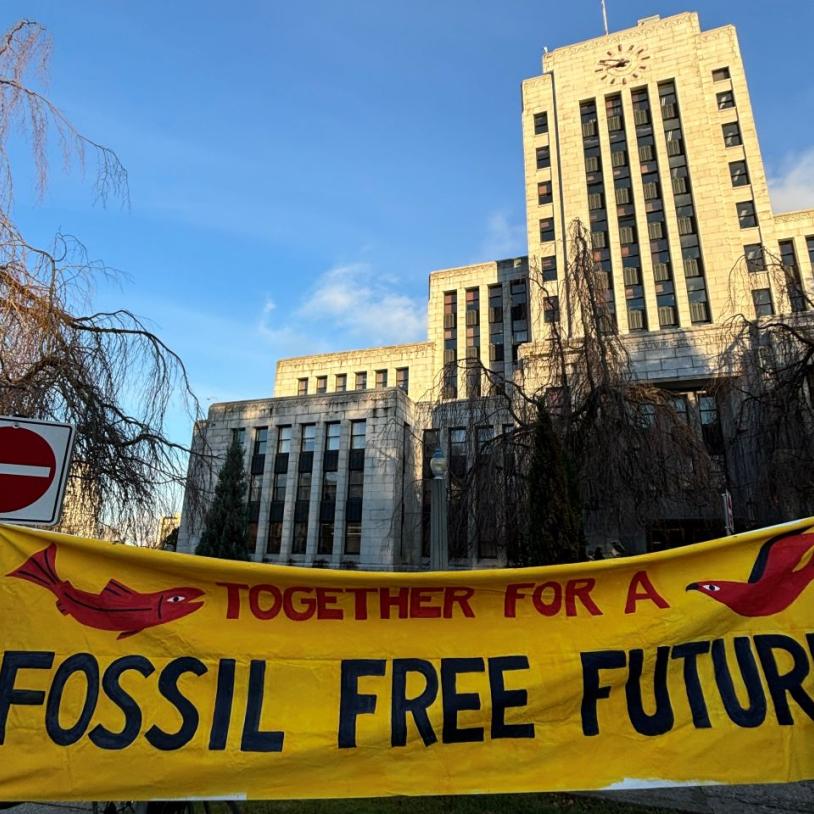Kinder Morgan CEO's TransMountain 'Hubris' Underestimates Pipeline Opposition in B.C.
Tuesday, May 12, 2015Richard Kinder, Houston-based billionaire and CEO of Kinder Morgan Inc., told an industry audience last week the TransMountain pipeline expansion project “will go forward” if granted approval at the federal level, despite growing and very vocal opposition to the project in British Columbia.
Kinder said pipeline opponents are using “spurious arguments” to purposely strangle pipeline projects across North America as a means of fighting development in the Alberta oilsands.
“I am sure there are legitimate concerns about any mega infrastructure development, but a lot of this is [about] the pipeline as a choke point to get at production of the oilsands, which there are people in Canada and the U.S. who want to strangle that altogether,” Kinder said.
Kinder’s comments seem to affirm criticism that the company is refusing to take local opposition seriously.
“Rich Kinder's optimism shows he really does not understand B.C.,” Tzeporah Berman, adjunct professor of environmental studies at York University, told DeSmog Canada. “British Columbians love this coast,” she added, noting the recent bunker fuel spill in Vancouver’s English Bay “was a real wake up call.”
“Rich Kinder's confidence is surprising given Enbridge's Northern Gateway fiasco, the looming Supreme Court challenges to the National Energy Board’s pipeline review, the First Nations court cases and the polling showing that the vast majority of British Columbians are opposed to his project.”
The TransMountain review process has been fraught with tensions between the National Energy Board (NEB) and municipal authorities, environmental organizations and local First Nations.
Several major environmental organizations along with two opposition parties are calling on Premier Christy Clark to pull out of the federal review process. The call for withdrawal is supported by the Union of B.C. Municipalities, the Association of Vancouver Island and Coastal Communities and coastal First Nations.
Frustration with the review process has grown steadily in recent months, led in part by Kinder Morgan’s refusal to disclose information to intervenors. In addition, the NEB process prevented many members of the public — including climate scientists and other experts — from participating due to new exclusive rules.
“If the NEB really wanted to hear from British Columbians, why didn’t they design a process where our voices could be heard?” Caitlyn Vernon from the Sierra Club B.C. asked. “That’s why the B.C. government needs to step in and create a review that includes local voices, respects municipalities and First Nations, and considers the full impacts of Kinder Morgan’s proposal — especially its contribution to climate change.”
Keith Stewart, climate and energy campaigner with Greenpeace Canada, said Kinder’s recent claim points to a sense of entitlement prominent within industry.
“It is indicative of the hubris of the oil industry that CEOs assume that they have a right to build what they want and where they want,” Stewart said.
“Mr. Kinder is not only underestimating the depth of opposition to his new pipeline, but he also doesn't seem to understand that concern over climate change isn't going to go away.”
Eoin Madden from the Wilderness Committee said Kinder’s strong position is purely a matter of corporate posturing.
“To be honest, I don't think Rich Kinder lacks respect for the seriousness of pipeline opposition here in B.C.,” Madden said. “His role at Kinder Morgan demands that he publicly appear confident and supportive of the TransMountain pipeline project regardless of whether or not his moral and business sense screams that it’s a dead project.”
He added the conversation around Enbridge’s Northern Gateway pipeline played out in a similar way.
However, Madden said, “I do think Kinder is purposely blind to the public interest in this issue. Why? Because he is paid large amounts of money to be.”
But things may be different after the English Bay spill, Madden said.
“One thing remains crystal clear in its aftermath: folks in this part of the world care deeply about the Salish Sea, and seeing those waters sullied really hurt.”





